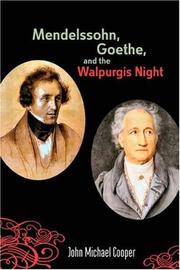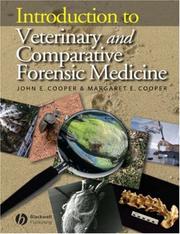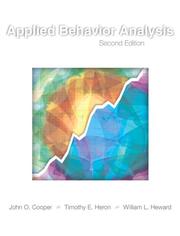| Listing 1 - 4 of 4 |
Sort by
|

ISBN: 9781580462525 1580462529 9781580466912 1580463681 9786612080678 1282080679 1580466915 Year: 2007 Publisher: Suffolk Boydell & Brewer
Abstract | Keywords | Export | Availability | Bookmark
 Loading...
Loading...Choose an application
- Reference Manager
- EndNote
- RefWorks (Direct export to RefWorks)
'Mendelssohn, Goethe, and the Walpurgis Night' addresses tolerance and acceptance in the face of cultural, political, and religious strife. Its point of departure is the Walpurgis Night. The Night, also known as Beltane or May Eve, was supposedly an annual witches' Sabbath that centered around the Brocken, the highest peak of the Harz Mountains. After exploring how a notoriously pagan celebration came to be named after the Christian missionary St. Walpurgis (ca. 710-79), John Michael Cooper discusses the Night's treatments in several closely interwoven works by Goethe and Mendelssohn. His book situates those works in their immediate personal and professional contexts, as well as among treatments by a wide array of other artists, philosophers, and political thinkers, including Voltaire, Lessing, Shelley, Heine, Delacroix, and Berlioz. In an age of decisive political and religious conflict, Walpurgis Night became a heathen muse: a source of spiritual inspiration that was neither specifically Christian, nor Jewish, nor Muslim. And Mendelssohn's and Goethe's engagements with it offer new insights into its role in European cultural history, as well as into issues of political, religious, and social identity - and the relations between cultural groups - in today's world. John Michael Cooper is professor of music at Southwestern University and author of 'Mendelssohn's "Italian" Symphony' (Oxford University Press).
Other (Philosophy). --- Mendelssohn-Bartholdy, Felix, --- Goethe, Johann Wolfgang von, --- Europe --- Religious life and customs. --- Other (Philosophy) --- Alterity (Philosophy) --- Otherness (Philosophy) --- Philosophy --- 18th and 19th Century. --- European Culture. --- Goethe. --- Mendelssohn. --- Walpurgis Night.
Digital
ISBN: 9781580466912 Year: 2007 Publisher: Suffolk Boydell & Brewer
Abstract | Keywords | Export | Availability | Bookmark
 Loading...
Loading...Choose an application
- Reference Manager
- EndNote
- RefWorks (Direct export to RefWorks)

ISBN: 9781405111010 Year: 2007 Publisher: Oxford : Blackwell Publishing,
Abstract | Keywords | Export | Availability | Bookmark
 Loading...
Loading...Choose an application
- Reference Manager
- EndNote
- RefWorks (Direct export to RefWorks)
Forensic medicine --- Animal welfare --- Autopsy --- veterinary

ISBN: 0131421131 9780131421134 Year: 2007 Publisher: Upper Saddle River (N.J.) : Pearson/Prentice Hall,
Abstract | Keywords | Export | Availability | Bookmark
 Loading...
Loading...Choose an application
- Reference Manager
- EndNote
- RefWorks (Direct export to RefWorks)
Applied Behavior Analysis provides a complete description of the principles and procedures needed to systematically change socially significant behavior and to understand the reasons for that change. This comprehensive text, appropriate for courses in basic principles, applications, and behavioral research methods, helps students, educators, and practitioners appreciate and begin to acquire the conceptual and technical skills necessary to foster socially adaptive behavior in diverse individuals. The second edition includes:More than 1,000 citations to primary-source literature, including both classic and contemporary studies A glossary of more than 250 technical terms and concepts More than 100 graphs displaying original data from peer-reviewed research, often accompanied by detailed descriptions of the procedures used to collect the data represented Five new chapters written by leading scholars in behavior analysis: Negative Reinforcement (Brian Iwata and Richard Smith), Motivating Operations (Jack Michael), Functional Behavior Assessment (Nancy Neef and Stephanie Peterson), Verbal Behavior (Mark Sundberg), and Ethical Considerations for Applied Behavior Analysts (Jose Martinez-Diaz, Tom Freeman, and Matthew Normand) The Behavior Analyst Certification Board® BCBA® and BCABA® Behavior Analyst Task List, Third Edition, specifying the minimum content all behavior analysts should master, is listed on the inside front and back covers. A chart at the beginning of each chapter identifies which items from the Task List are covered in that chapter, and an appendix lists the page numbers where the concepts, principles, or procedures related to each item appear on the Task List.
| Listing 1 - 4 of 4 |
Sort by
|

 Search
Search Feedback
Feedback About UniCat
About UniCat  Help
Help News
News